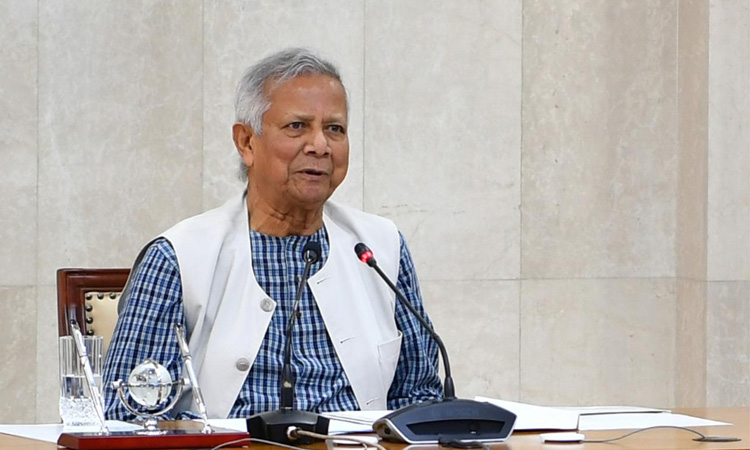News Flash
News Flash

DHAKA, Feb 14, 2025 (BSS) - Chief Adviser Professor Muhammad Yunus has vowed that he would not allow key figures from the ousted Sheikh Hasina regime to escape punishment, noting that the people of Bangladesh will not forgive his administration if they fail to bring them to justice.
"We'll bring her (Hasina) to justice. It has to happen, otherwise people will not forgive us," he told UAE state-owned English daily The National, mentioning that deposed prime minister Sheikh Hasina and her senior officials would be sought out and returned home to face the full force of the law.
Nobel Peace Prize laureate Prof Yunus was appointed chief adviser to the interim government in August last year (2024) after Sheikh Hasina fled when her official residence was stormed by protesters. She had presided over one-party rule for 15 years. Her police and supporters killed an estimated 1,400 people in student protests in July and August, with another 11,000 injured. She fled to India, where she remains in exile.
"We have sent notice to India that Sheikh Hasina should be repatriated - we have lots of evidence, including the UN High Commissioner's Report on Human Rights," Prof Yunus told The National in an interview on the sidelines of the World Governments Summit in Dubai.
"This is a testimonial to everything they have done. The UN has documented this and we have stacks of evidence of what she and her government, and her immediate supporters, have done to the country.
"We have already started the legal process, so we are hoping that the legal process will continue and we'll bring her to justice. It has to happen, otherwise people will not forgive us," he said.
Of those shot and killed by security forces during the uprising, 13 percent are believed to have been children. Police in Bangladesh also reported 44 of its officers were killed.
'A wonderful gesture'
Protests spilt into the diaspora of Bangladeshis around the world, including in the UAE. At the height of the unrest, 53 of those protesting in the UAE were arrested and jailed but later released after a personal call from Prof Yunus to President Sheikh Mohamed.
It was the start of a rebuilding of relations with the UAE and wider region, the Chief Adviser said.
"Our relationship with the UAE is fantastic," he said. "The UAE put some Bangladeshis who were demonstrating on the street in support of what was happening in Bangladesh in jail, because they violated the local law.
"When I took over as the head of the interim government, I appealed to the President of the UAE, I explained to him why they did it. It's not because they are doing something which is not desirable, they were simply expressing their enthusiasm and support for the things happening in Bangladesh.
"I hoped he could forgive them and let them come out of jail and I was very happy that he immediately did that. It was a wonderful gesture and the whole of Bangladesh celebrated that," he added.
"I feel so happy that the President of the UAE has released these prisoners at my request. Our relationship is very good because we have 1.2 million Bangladeshis working here [in the UAE]. It's very important for us."
Reform Initiatives underway
Attention for Prof Yunus and his advisers has now tuned to domestic reform, in an attempt to rebuild a more prosperous, secure nation with a strong, democratically elected leadership.
Six commissions have been established to reform several sectors of society, including the judiciary, electoral system, police and administration. Meanwhile, an anti-corruption commission will get to work on recovering government funds stolen or misused by the previous administration.
The reforms aim to build a more secure state system based on public ownership, welfare and accountability, placing more control into the hands of Bangladesh's 174 million population.
"Our immediate target is to restore law and order as soon as possible, and fix the economy so it is functioning again, along with the banking system," Prof Yunus said.
"We take these recommendations and go to all the political parties and civil societies to ask which one you would like to implement now, which one you would like to implement in the future and which one you don't want to implement at all.
"That's the limit of our government. Then we will be happy to have a decent election for the first time in 16 years - a reliable, visible and transparent election. People will celebrate and our job will be done."
Speaking on stage in Dubai earlier, the Bangladesh Chief Adviser told an audience he would be pleased to step aside when his task is complete.
"Now we have a consensus-building commission to hear the recommendations that are agreed upon for a charter that will then lead to an election in December of this year," he said. "When my job is done, I will hand over to the elected government," he added.